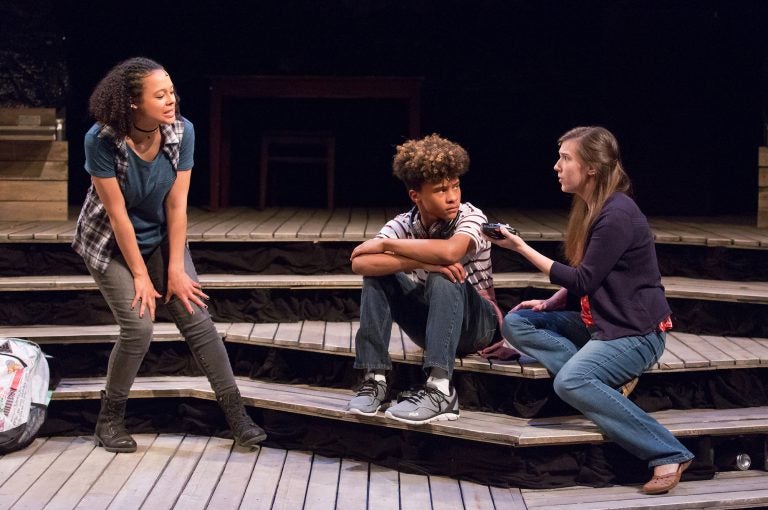Inspired by truth, ‘Minors’ for cash, a new musical from Lantern Theater
Luzerne County's "cash for kids" scandal inspires a musical at the Lantern Theater.

Terran Scott, Mehki Williams, and Grace Tarves in Lantern Theater Company's world premiere production of 'Minors' by Kittson O'Neill and Robert Kaplowitz. (Courtesy of Mark Garvin)
Two judges in Luzerne County – that’s Wilkes-Barre – were sentenced in 2011 to prison in the “kids for cash” scandal, a kickback scheme that resulted in the incarceration of thousands of Luzerne County children. Under a zero-tolerance policy for even the slightest infractions, and at hearings without lawyers present, children were sentenced to privately run for-profit juvenile detention centers. The judges received money for sending them to these facilities.
One child was sentenced for creating an Internet page that dissed a school official. Another teenager was given six months for flipping the bird to a police officer. An 11-year-old was dispatched in leg shackles after his parents couldn’t come up with the money for a fine. Eventually, the criminal records of about 4,000 minors would have to be erased.
The “kids for cash” scandal is the inspiration for the new musical “Minors,” now in its Lantern Theater world premiere in a nicely wrought production from director Mathew Decker, the co-founder of Norristown’s Theatre Horizon. The musical, written by Kittson O’Neill and Robert Kaplowitz, is a Lantern commission and, to my mind, the first musical the company has produced in its 25 years.
The show is dark like its mostly barren set, and bleak, just like the future of Luzerne County’s anthracite coal country around the turn of this century when the plot takes place. “Minors” is not a fact-by-fact telling of the “kids for cash” case but it’s close enough – it does what theater can do so effectively: Focus on the effects rather than the details. Those effects are blistering. Young lives are upturned at the very point when the pressures of encroaching adulthood are becoming clear. Parents who never interacted with the legal system are easily convinced that lawyers aren’t necessary. Plus, they couldn’t pay the legal fees if they tried.
They do their very best – “I’m gonna try even though no one ever tried with me,” sings one parent. But Luzerne County’s old-boy crony system dashes all of that, and with no mercy. “No second chances,” a judge warns a high-school class, “no strike two.” The result is a community running on a foundation of hopelessness where, as one child victim sings after the scope of the kickbacks begin to be apparent, “money makes the world go round, it makes wrong right.”
“Even if we have rights, we can’t afford them,” she concludes.
The four youngsters in “Minors” (played by Grace Tarves, Brady Fritz, Terran Scott and Mekhi Williams) are arrested on various charges: underage drinking, stealing a flashing light from county property, riding a stolen bike unwittingly bought by a parent, creating a foul-mouthed Myspace page. Their parents (Jennie Eisenhower, Ben Dibble, Marybeth Gorman, all highly established actors and excellent) are suddenly forced to deal alone with a threatening judge (Paul L. Nolan, who plays ruthlessness here so well) and a system whose corruption they can’t even imagine.
Other character figures in “Minors” are “breaker boys,” who finger-pick the impurities from mined coal. (That role and others are played assertively by Sav Souza.) The breaker boy is the show’s link between judicial corruption and the history of coal mining operators who cared more for profits than for the safety of their employees.
That link is weak, at least in the way the show attempts to make it; you have to understand a bit about mining disasters in and around Luzerne County to know why songs about mines have anything to do with a corrupt judge. It’s all about “The Man,” to use the street term, but hard to follow unless you’ve read the excellent history piece by dramaturg Meghan Winch in Lantern’s playbill.
The music and lyrics to “Minors” work well, but in some cases, the mostly short songs backed by a solid four-person band, feel unfinished. (There are some fine performances but the night I saw the show, a few renditions that needed more rehearsal.)
The show as a whole is intense without letup except for a couple of lines that elicit smiles toward the end. As a result, we see the down-side of these characters, but no nuance. This makes the musical read like the news stories the show came out of, but on balance, “Minors” is compelling, a worthwhile look at what happens when the scales of justice are not just tipped, but removed.
_
“Minors,” produced by Lantern Theater, runs through June 30 at St. Stephen’s Theater, to the rear of St. Stephen’s Church, at 10th Street between Market and Chestnut Streets in Philadelphia. 215-829-0395 or lanterntheater.org.
WHYY is your source for fact-based, in-depth journalism and information. As a nonprofit organization, we rely on financial support from readers like you. Please give today.




